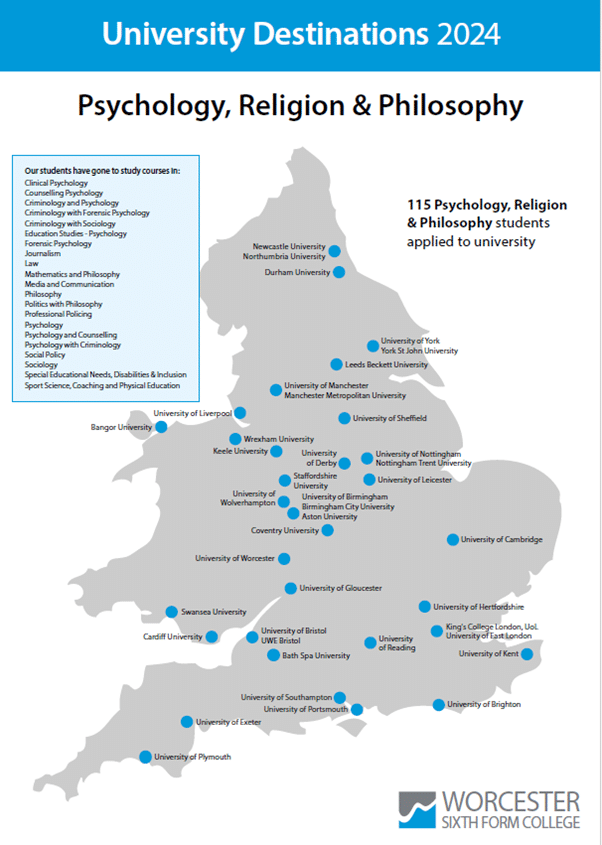Why Study Philosophy, Ethics and Religion?
Philosophy, Ethics and Religion is about people and their questions. The subject gets to grips with people’s real lives, what they believe and what makes them act as they do. It is also about societies and cultures often very different from your own, and how these have evolved over time.
This course will appeal to you if you are enthusiastic and thoughtful enough to want to understand the deeply held convictions of others and to examine your own prejudices, assumptions and beliefs. You will be able to study what different thinkers have said on these questions, as well as studying a world faith in depth.
Why Study Philosophy, Ethics and Religion at Worcester Sixth Form College?
We will use a whole host of co-operative and independent learning methods to assist your learning. There is a good deal of discussion together and plenty of resources are available to support this course, which can be easily accessed through Moodle. We have strong links with Worcester University and attend post 16 study events with students across the county.
Topics covered include the following:
Philosophy of Religion
- Philosophical issues and questions
- The nature and influence of religious experience
- Problems of evil and suffering
- Philosophical language
Religion and Ethics
- A study of three ethical theories
- Application of ethical theories to issues of importance
- Ethical language
- Medical ethics: beginning and end of life issues
Study of One World Religion
- Religious beliefs, values and sources of wisdom and authority
- Practices that shape and express religious identity
- Social and historical developments
- Works of scholars
- Religion and society
Students say:
‘Philosophy helps you to establish your views’.
‘RS helps me to understand what makes people tick’.
Employers say: Metropolitan Police Officer:
‘It shows that a person has some understanding of the
beliefs and values of others’

Em Moult
Progression Opportunities
You can go on to do degree courses in Religious Studies, Theology or Philosophy. It is a valuable qualification for higher education and many jobs because the thinking skills it encourages are easily transferable to other subjects. Major employers accept Philosophy and Ethics at GCSE and A Level as a valid qualification. Students who have taken the subject go on to careers in children’s work, nursing, banking, journalism, policing, law, acting, writing, teaching and retailing.

Course Specifics / Entry Requirements
| Qualification Name | Maths GCSE Req. | English GCSE Req. | Other Req. | Desirable Qualifications | Skills & Attributes Required for Success | Guidance on Costs or Commitments |
|---|---|---|---|---|---|---|
| Philosophy, Ethics and Religion | 4 | GCSE Religious Studies (or short course) at grade 4 or above. | Open-minded interest in religion. Interest in moral issues. Willingness to contribute to discussion | Trip(s) to places of worship. Transport costs only plus optional donations. |
Related Courses / Activities

Latin Certificate

Duke of Edinburgh

Travel and Tourism Level 3 Applied



